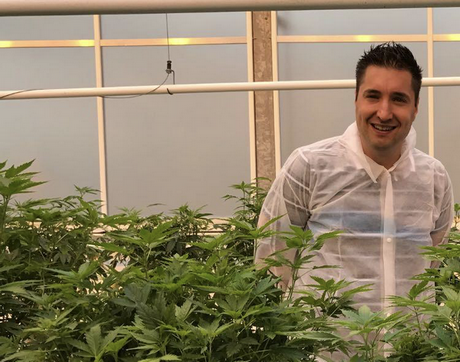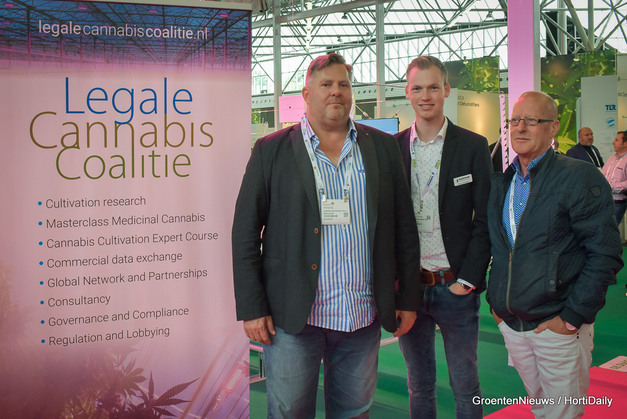Many trade shows around the world had to be postponed because of the global pandemic. At the same time, this situation pushed organizers to think of different concepts and formats, so to keep the show going thus providing the industry a place to gather. This is exactly what Greentech did with its 2020 edition: over three days of digital conference, horticultural companies had a place to connect and meet old and new clients. Since Greentech is a Dutch organization, this was the perfect place to further discuss the cannabis supply chain experiment, the application process of which is about to hit the final stage.
During a Café Talk, with a very informal and neat format, some of the best Dutch experts on cannabis shared and discussed the challenges and the expectations of such an experiment. Jurien Koster with Ofinext was the host of the discussion, which saw Pim Molenaar with Cultivators in one corner, Laura Rastovac with Meteor Systems in another, and finally Thomas Rau with the Legal Cannabis Coalition.
The discussion started with Laura providing a concise background of the history of the cannabis industry in the Netherlands, mentioning all the contradictions in the regulations.
 Jurien Koster with Ofinext
Jurien Koster with Ofinext
Cannabis in the Netherlands
“Back in the 60s, opioids and heroin were very popular here in the Netherlands,” she explained. “Also cannabis was very popular. In order to put a stop to the consumption of so-called hard drugs, the government decided to make a distinction between, indeed, hard drugs and soft drugs, and decided to somewhat tolerate the soft drugs and having these consumers not dependent on the illicit market. Thus, in 1969, the first coffee shop was open.” However, this legislation did not officially legalize cannabis, leaving in the hand of the authority the decision to convict people for cannabis-related activities. At the same time, this power was never used, as the legislation was tolerant of the use of soft drugs. “However, all of this changed in the 80s, when some people started to be convicted,” she continued.
Laura Rastovac with Meteor Systems during the Cannabis Capital Convention, October 2019, Amsterdam.
“In the 90s, with drugs going to America from the Netherlands, the government was pressured to take action, and thus the toleration policy became harsher. This led to the closure of some coffee shops in 2016. The result of this was that the crime rate increased, yet the demand kept going up. The problem with such an approach is that criminal organizations don’t care about people’s health, they only care about profit. In 2017, a new political coalition was formed, and they agreed it was time to do something about that. So, they decided to set up a committee to do research on how possible it would be to decriminalize cannabis cultivation and to create a closed supply chain. In 2018, after one year of research, the committee concluded that it was indeed possible to have quality control on a cannabis supply chain. So, they set up this experiment with a duration of 4 years. If successful, they will have one year to do their evaluation and eventually make this fully official.”
The closed chain experiment
The most interesting thing about this experiment is that the coffee shops that will be in the municipalities where the licensed producers will grow will be obligated to participate in the experiment when it starts, which means that they will only be able to sell the products bought by said licensed producers. “There will be 6 to 10 producers, and they can be in any municipalities – provided the respective mayors will agree with that,” Laura points out.
However, the cannabis industry is very new, and applying for a license has never been easy. This process has been somewhat made even harder as the government was not very clear about a number of things; on top of that, the deadline for the applications is approaching fast. “Companies were given 6 weeks only to fill the application form,” Pim says. “This was extremely challenging for companies that didn’t start yet; at the same time, it gave a head start to those companies that were aware of this experiment and started preparing one year in advance. The problem is, anyway, that there is a lot of unclear stuff in the process, also with regards to the next steps.”
 Pim Molenaar with Cultivators
Pim Molenaar with Cultivators
Thomas Rau pointed out that the short period of time to present the application had to do with the Dutch political elections which will happen in March 2021. “I think they didn’t want to have the selection of the growers close to the elections period,” he said. “Nonetheless, growers had very little time to prepare the documents. If you didn’t have experience in this already, it was impossible to do it in such a short time. In addition to this, there is the possibility that there will be a lottery in the end: if there are more than 10 applicants that meet all the requirements, there will be a lottery among them. There’s still a bit of uncertainty, as you can see.”
 On the left, Thomas Rau during the last year's edition of the Greentech
On the left, Thomas Rau during the last year's edition of the Greentech
“When the process is not clear, you are giving away all the ammunitions to bring this to court,” Pim remarked. “At the same time, the less clear the criteria are, the more likely is that you will do something that you still have a chance to win. We anyway expect that everything will be eventually delayed.”
“This also because you have one year as a preparation period,” Thomas pointed out. “You have only one year to build your facility. If you have no background in this at all, you have to get some serious experts on cannabis in too short of a time. It can be doable if a company is already experienced in such matters. There are also other questions, however; the government said that producers will have to put out 1 kg of cannabis a day, the 25% of which should be hash. That is something that the government said, and we applicants have to deal with that. The real market is different though, it has been mainly illicit for many years: is 1 kg a day enough to serve the coffee shops?”
“That’s why it is of the utmost importance to listen to the coffee shops,” Laura said. “They know the market, they know the culture. There’s a good chance that this experiment will be successful, it has to be successful.”
